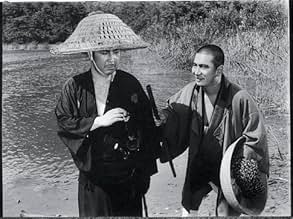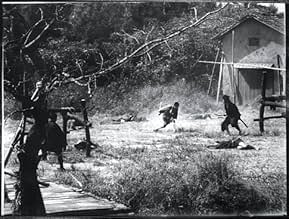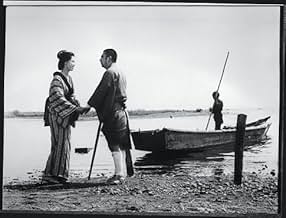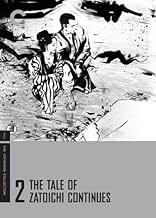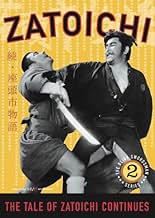IMDb-BEWERTUNG
7,2/10
2935
IHRE BEWERTUNG
Füge eine Handlung in deiner Sprache hinzuThe blind masseur and swordsman, Zatoichi, learns of a powerful political figure's secret and is quickly tailed by a group of killers.The blind masseur and swordsman, Zatoichi, learns of a powerful political figure's secret and is quickly tailed by a group of killers.The blind masseur and swordsman, Zatoichi, learns of a powerful political figure's secret and is quickly tailed by a group of killers.
- Regie
- Drehbuch
- Hauptbesetzung
Yaeko Mizutani
- Setsu
- (as Yoshie Mizutani)
Tomisaburô Wakayama
- Nagisa no Yoshiro
- (as Jô Kenzaburô)
Empfohlene Bewertungen
Seen on YouTube in black and white and, checking on
IMDb, it is in black and white. Beautiful music as usual, captivating story as usual, good acting and, especially, notable female beauties such as Masayo Banri and Yaeko Mizutani, two very beautiful Japanese women. Mixture inspired by drama and action, worth seeing.
Roughly a year after his first run-in with the shady Yakuza types of small-town Japan, a notorious blind swordsman blows back into town seeking an encore. Actually, the hopeful pacifist Zatoichi is merely interested in paying his respects at the grave of a fallen comrade, the honorable samurai he out-dueled last time, but the shadier denizens of this corrupt village have long memories and see his visit as an opportunity for revenge.
While that drama plays out, Ichi makes enemies with a misbehaving prince, befriends a trio of prostitutes and crosses paths with another acquaintance: a one-armed former romantic rival who still carries a grudge. The latter is portrayed by Tomisaburo Wakayama, later known for his lead role in the Lone Wolf and Cub films (and star Shintaro Katsu's real-life brother), which makes his eventual duel with Ichi doubly interesting as a sort of unofficial pre-crossover. Not for the last time, either, as 1970 would produce a match between our blind protagonist and Toshirô Mifune's Yojimbo... but that's a topic for another time.
As The Tale Continues is concerned, I found it a mild step down from the first film. There's more action this time, and a much faster pace, but the additional subplots make for a less focused narrative and drain power from the larger developments and reveals of the third act. Another outstanding performance from Katsu, though, and wow, what a final shot!
While that drama plays out, Ichi makes enemies with a misbehaving prince, befriends a trio of prostitutes and crosses paths with another acquaintance: a one-armed former romantic rival who still carries a grudge. The latter is portrayed by Tomisaburo Wakayama, later known for his lead role in the Lone Wolf and Cub films (and star Shintaro Katsu's real-life brother), which makes his eventual duel with Ichi doubly interesting as a sort of unofficial pre-crossover. Not for the last time, either, as 1970 would produce a match between our blind protagonist and Toshirô Mifune's Yojimbo... but that's a topic for another time.
As The Tale Continues is concerned, I found it a mild step down from the first film. There's more action this time, and a much faster pace, but the additional subplots make for a less focused narrative and drain power from the larger developments and reveals of the third act. Another outstanding performance from Katsu, though, and wow, what a final shot!
Even though it was only released a few months after the first movie, The Tale of Zatoichi, the second and last movie of the Zatoichi franchise shot in black and white, takes places exactly one year after the events of the first film and is directly related to it. It's nearly impossible to watch this movie independently as it complements the brilliant first strike accurately. Despite an overall faster pace, it has a more melancholy atmosphere due to the main character's goal to pay respects to his fallen friend and opponent and a moody soundtrack.
Zatoichi is on his way to pay respects at the grave of his friend Hirate whom he was forced to kill one year earlier. The movie has three different plots leading into one. First of all, Zatoichi is hired to massage a powerful lord but when he realizes that the nobleman is insane, he is tracked down by the lord's retainers and hired samurai who want to prevent Zatoichi from telling other people the truth about the lord's mental condition. Secondly, the movie follows a one-armed swordsman and his associate who claim to be samurai but are actually criminals on the run. Thirdly, the movie gives us some more details about the yakuza Zatoichi teamed up with in the first film who felt insulted by him and decide to track him down when they hear he is coming back to town. The movie has a twist that links the three story lines together and ends in a rather abrupt way but still manages to answer all essential questions in just seventy-two minutes.
If compared to the first film, this one has a much faster pace and features more spectacular sword fights. Zatoichi regularly faces big crowds on beaches and in gardens and shows off his precise skills in breathtaking manner. From that point of view, the vivid sequel is more spectacular than the first film. The characters have as much depth as in the first film as Zatoichi still proves he has a strong moral compass while he meets ruthless criminals, charming prostitutes and people somewhere in between on his way to his friend's and opponent's grave. The element that is less convincing than in the first film is the more fast-paced and at times slightly confusing story that feels rushed in just seventy-two minutes and doesn't develop as much depth as it could have requested.
If you are looking for breathtaking martial arts choreography, you might prefer this movie over the first film. If you are looking for a skilled plot with atmosphere and depth, the first movie is clearly superior. I personally prefer the more intellectual first film but must admit that the second one is definitely energizing and entertaining. It's positive that the sequel didn't just try to copy the style of the first film and tried out something different. Overall, it's a quite good movie that justifies the numerous sequels based upon the first Zatoichi film and that should please to any fan of Japanese culture and martial arts cinema.
Zatoichi is on his way to pay respects at the grave of his friend Hirate whom he was forced to kill one year earlier. The movie has three different plots leading into one. First of all, Zatoichi is hired to massage a powerful lord but when he realizes that the nobleman is insane, he is tracked down by the lord's retainers and hired samurai who want to prevent Zatoichi from telling other people the truth about the lord's mental condition. Secondly, the movie follows a one-armed swordsman and his associate who claim to be samurai but are actually criminals on the run. Thirdly, the movie gives us some more details about the yakuza Zatoichi teamed up with in the first film who felt insulted by him and decide to track him down when they hear he is coming back to town. The movie has a twist that links the three story lines together and ends in a rather abrupt way but still manages to answer all essential questions in just seventy-two minutes.
If compared to the first film, this one has a much faster pace and features more spectacular sword fights. Zatoichi regularly faces big crowds on beaches and in gardens and shows off his precise skills in breathtaking manner. From that point of view, the vivid sequel is more spectacular than the first film. The characters have as much depth as in the first film as Zatoichi still proves he has a strong moral compass while he meets ruthless criminals, charming prostitutes and people somewhere in between on his way to his friend's and opponent's grave. The element that is less convincing than in the first film is the more fast-paced and at times slightly confusing story that feels rushed in just seventy-two minutes and doesn't develop as much depth as it could have requested.
If you are looking for breathtaking martial arts choreography, you might prefer this movie over the first film. If you are looking for a skilled plot with atmosphere and depth, the first movie is clearly superior. I personally prefer the more intellectual first film but must admit that the second one is definitely energizing and entertaining. It's positive that the sequel didn't just try to copy the style of the first film and tried out something different. Overall, it's a quite good movie that justifies the numerous sequels based upon the first Zatoichi film and that should please to any fan of Japanese culture and martial arts cinema.
'The Tale Of Zatoichi Continues (1962)' works both as a stand-alone experience and a direct continuation of its predecessor, playing with similar themes but framing them through a lens soaked with regret. It's a shorter, more action-packed affair but it's still primarily a character study. The eponymous stoic swordsman unwillingly gets caught up in the kind of trouble that forces him to show off his skills, which tend to swiftly and decisively resolve his immediate issues. Most of his introspection surrounds the melancholy of the last movie's events. Towards the end, however, a new relationship is revealed that threatens to see history repeat itself. Katsu, who's still fantastic in the role, is joined by his brother - perhaps better known for the much pulpier 'Lone Wolf and Cub (1972-1976)' series - which results in most of the film's emotion. It's rather resonant, leaving the entire experience tinged in sadness. The focus on character is, essentially, what makes the film so successful. You care about all the major players and their struggles resonate with you. The narrative moves almost as swiftly as Zatoichi's sword, ultimately coming to an incredibly abrupt end, and it balances its tone perfectly. It isn't groundbreaking but it's very enjoyable. It's also very well-made. Its crisp black-and-white cinematography is often highlighted by stunning chiaroscuro lighting and absolutely perfect composition, its dialogue is to the point but never on the nose, and its acting is subtle but successful. When it comes to the action, the thing doesn't disappoint, either. Most of it is shot wide, allowing you to see every quick-moving moment uninterrupted, and the choreography dances between unbearable anticipation and samurai-slaying pay-off impeccably. It isn't perfectly clean, with the villains scrambling about in fear before they make their ill-fated attempt on our often almost clumsy but always keenly aware protagonist, which lends a lot of credence to the fact that it's supposed to involve a highly feared yet blind man. Overall, the picture is very entertaining. It won't change your life, but it'll make you smile more than once. 7/10
The following review is an extract from the book "Shintaro Katsu´s Zatoichi: Complete guide to all movies", which is now available on Amazon.
Zatoichi (Shintaro Katsu), the famous and prodigious masseur and blind swordsman, has arrived in a new region after the adventures narrated in the first film. After confronting some arrogant soldiers, who throw him into the water when they discover him in the boat in which they were crossing a river, he is hired to massage the head of a samurai detachment. However, while he is doing this work, he indiscreetly discovers a secret of the lord ("I had never had a client like this one..."), so the samurai will persecute him with the intention of killing him.
(...)
Second part of a long line of films with the mythical blind masseur, hardened player and wandering swordsman Zatoichi as the protagonist. The actor who gives life to the character is, once again, the great Shintaro Katsu. The director of this second part is not Kenji Misumi, but another director (Kazuo Mori). The sequel to "Zatoichi monogatari" (shot the same year, 1962) is not at the same level as the original. There are some gaps in the story; for example, it is never quite clear why the samurai want to kill Zatoichi (What is the secret that the masseur has discovered about the lord? It must be such a big secret that not even the spectator has the right to know...
In any case, Zoku Zatôichi monogatari's viewing is a good opportunity to see Shintaro Katsu and Tomisaburo Wakayama (Zatoichi and Yoshiro, repectively), two greats of the sixties and seventies chambara, who were also brothers in real life.
Zatoichi (Shintaro Katsu), the famous and prodigious masseur and blind swordsman, has arrived in a new region after the adventures narrated in the first film. After confronting some arrogant soldiers, who throw him into the water when they discover him in the boat in which they were crossing a river, he is hired to massage the head of a samurai detachment. However, while he is doing this work, he indiscreetly discovers a secret of the lord ("I had never had a client like this one..."), so the samurai will persecute him with the intention of killing him.
(...)
Second part of a long line of films with the mythical blind masseur, hardened player and wandering swordsman Zatoichi as the protagonist. The actor who gives life to the character is, once again, the great Shintaro Katsu. The director of this second part is not Kenji Misumi, but another director (Kazuo Mori). The sequel to "Zatoichi monogatari" (shot the same year, 1962) is not at the same level as the original. There are some gaps in the story; for example, it is never quite clear why the samurai want to kill Zatoichi (What is the secret that the masseur has discovered about the lord? It must be such a big secret that not even the spectator has the right to know...
In any case, Zoku Zatôichi monogatari's viewing is a good opportunity to see Shintaro Katsu and Tomisaburo Wakayama (Zatoichi and Yoshiro, repectively), two greats of the sixties and seventies chambara, who were also brothers in real life.
Wusstest du schon
- WissenswertesThe Tale of Zatoichi proved to be so popular that this sequel went into production the same year, 1962.
- VerbindungenFeatured in Best in Action: 1962 (2018)
Top-Auswahl
Melde dich zum Bewerten an und greife auf die Watchlist für personalisierte Empfehlungen zu.
- How long is The Tale of Zatoichi Continues?Powered by Alexa
Details
- Erscheinungsdatum
- Herkunftsland
- Sprache
- Auch bekannt als
- Zatoichi 2: The Tale of Zatoichi Continues
- Produktionsfirma
- Weitere beteiligte Unternehmen bei IMDbPro anzeigen
- Laufzeit1 Stunde 12 Minuten
- Farbe
- Sound-Mix
- Seitenverhältnis
- 2.35 : 1
Zu dieser Seite beitragen
Bearbeitung vorschlagen oder fehlenden Inhalt hinzufügen

Oberste Lücke
By what name was Die Reise des Zatoichi (1962) officially released in India in English?
Antwort
